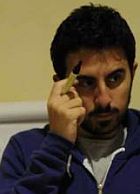Omar Robert Hamilton writes: I sit, for the 12th hour now, alone and struggling for what to do. For the first time since I got on a plane for Egypt on January 29, 2011, I am at a loss.
Worse days than today lie ahead of us.
We thought we could change the world. We know now that that feeling was not unique to us, that every revolutionary moment courses with the pulse of a manifest destiny. How different things feel today. I will not bury our convictions, but that feeling – youthful optimism? naiveté? idealism? foolishness? – is now truly and irrevocably dead.Omar Robert Hamilton
I mourn the dead and I despise those killing them. I mourn the dead and I despise those sending them to their deaths. I mourn the dead and I despise those that excuse their murder. How did it come to this? How did we get here? What is this place?
It is February 12, 2011. Hosni Mubarak has fallen. In the morning I will fly to America to finish a job, before moving permanently to Cairo to help build the new country. I am sitting on my mother’s balcony. We are smoking cigarettes and drinking tea to keep out the cold and talking; about all that we’ve seen and done, about all that we’re going to do. Everything, on that night, was possible. Our conversation ranges from the grandiose of the global revolution to the practical re-thinking of ministerial appointments to the minutiae of the requirements of the film school that should be established. We talked through the night. I took notes.
It is, perhaps, this memory that hurts me the most.
By the time I return from America the army had cleared two sit-ins, begun court-martialing civilians en masse and assaulting women protestors with virginity tests. The revolution now is smaller, but serious, focused and under sustained attack. The un-fallen state, the deep state, the client state; once a month, every month, it attacks. It clears Tahrir in March, April, August and December. It attacks protestors at the Israeli Embassy. It envelopes downtown Cairo in a November mist of Pennsylvanian tear gas. It rains down rocks and Molotov cocktails from the roof of the Cabinet building. It welds shut the doors of the Port Said stadium deathtrap. Every month, people die fighting it.
There were moments when we could have broken the army’s grip on the country. We should have stayed in Tahrir after Mubarak was ousted. Tahrir was in the driving seat and hadn’t yet acquired the politicians to sell it out. But we left. Everyone said they would be back the next day and then, somehow, they weren’t. People wanted to shower and to sleep in their own beds. Then spontaneous cleaning brigades of earnest patriots spread through the city and by midday everything was nice and tidy and gone.
In November 2011 and in January 2012 the streets echoed with chants demanding the end of military rule. But now it had become the self-appointed role of the politicians to translate street action into political gain. Now, the army had people to talk to. Had all the forces that were supposedly against the military – the revolutionaries, the liberals, the Brotherhood and the Salafis – ever truly united where might we have been today? Dead, possibly. But maybe not. Maybe somewhere closer to a civilian state. [Continue reading…]
War in Context
… with attention to the unseen


